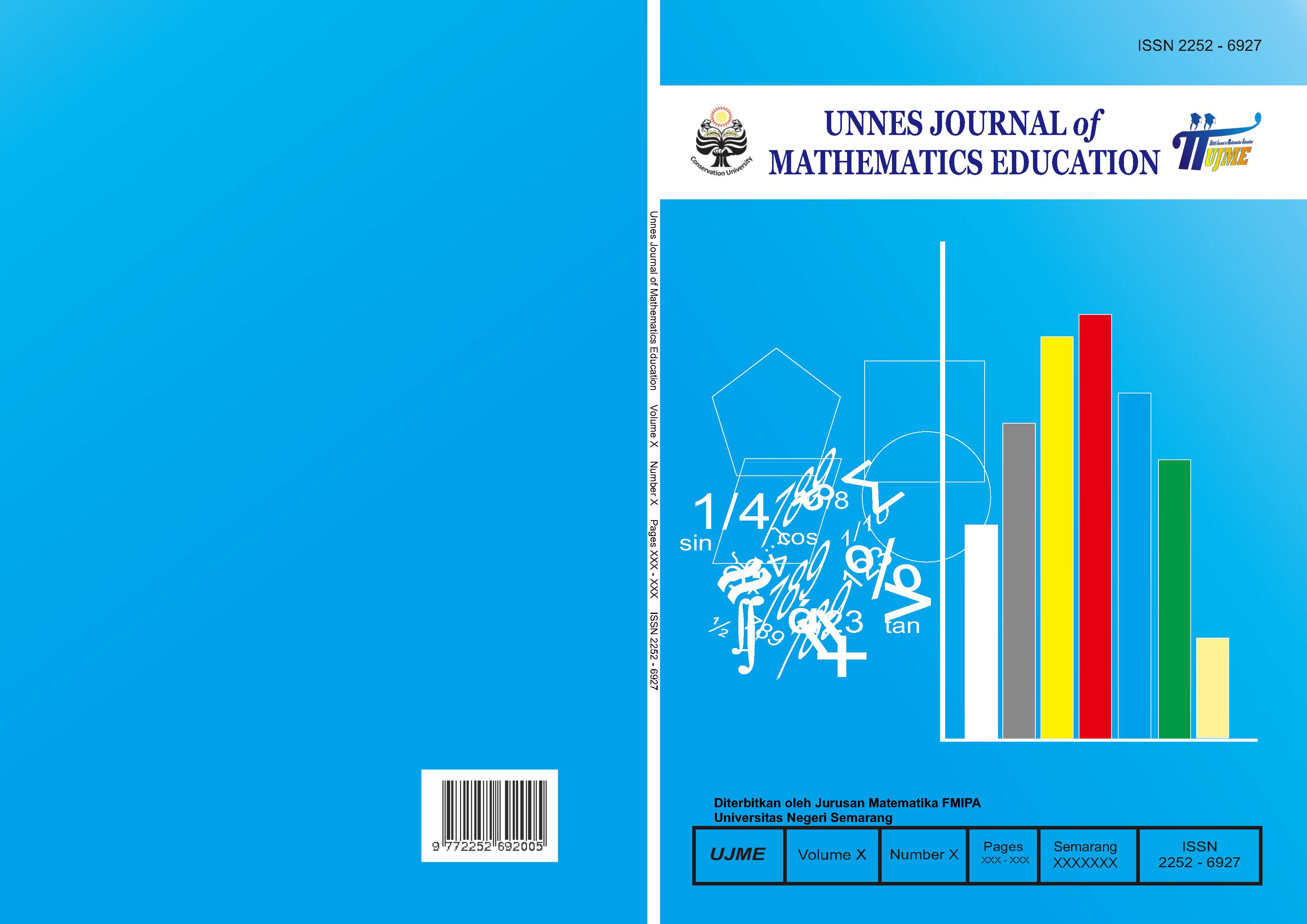Keefektifan Implementasi CTL berbantuan Komik Matematika dan Langkah Penyelesaian Krulik dan Rudnick untuk Meningkatkan Kemampuan Pemahaman dan Disposisi Matematis Siswa
##plugins.themes.academic_pro.article.main##
Abstract
This study aims to know the effectiveness of the CTL models aided by mathematical comics and Krulik and Rudnick’s steps in problem solving to improve the ability of student’s mathematical understanding and disposition. Population in this study were VIIIA grade students up to VIIIE of SMP Negeri 1 Pulokulon year 2015/2016 with a true experimental design types posttestÂonly control design and samples are chosen randomly. Data analysis that used in this study were an average of completeness test, the proportion test, the average difference test, and MannÂWhitney test. The results showed that (1) the ability of student’s mathematical understanding of the subject that have gained CTL models aided by mathematical comics and Krulik and Rudnick’s steps in problem solving have achieved the completeness in groups and classical; (2) the ability of student’s mathematical understanding of students who have gained CTL models aided by mathematical comics and Krulik and Rudnick’s steps in problem solving more than students with expository models aided by LKS, (3) the mathematical disposition of student’s who have gained CTL models aided by mathematical comics and Krulik and Rudnick’s steps in problem solving more than students with expository models aided by LKS.
##plugins.themes.academic_pro.article.details##
References
Bernard, M. 2015. Meningkatkan Kemampuan Komunikasi Dan Penalaran Serta Disposisi Matematik Siswa SMK dengan Pendekatan Kontekstual Melalui Game Adobe Flash Cs 4.0. Jurnal Ilmiah Program Studi Matematika STKIP Siliwangi Bandung, Vol 4 No.2, hlm 197-222.
Budiyani, A. 2009. Efektivitas Pendekatan Konstruktivisme dalam Pembelajaran Matematika Ditinjau dari Aktifitas Belajar Siswa SMP. (Tesis). Surakarta: Pascasarjana UNS.
Carson, J. 2007. A Problem with Problem Solving: Teaching Thingking Without Teaching Knowledge. The Mathematics Educator, Vol 17 No. 2, hlm 7-14.
Indriana, D. 2011. Ragam Alat Bantu Media Pengajaran. Yogyakarta: DIVA Press.
Johnson, B. E. 2002. Contextual Teaching and Learning. California: Corwin Press, Inc.
Lidinillah, D. A. M. 2008. Strategi Pembelajaran Pemecahan Masalah di Sekolah Dasar. Jurnal Pendidikan Dasar, Vol 1 No.10, hlm 67-77.
Margiati, K. Y. 2012. Pengaruh Pemanfaatan Media Komik Matematika Terhadap Hasil Belajar Kelas V Pontianak Tenggara. Jurnal Pendidikan dan Pembelajaran, Vol 1 No. 1. Tersedia di http://jurnal.untan.ac.id/index.php/jpdpb/article/view/450 [diakses 11 Agustus 2016].
Marlina, Hajidin, & Ikhsan, M. 2014. Penggunaan Model Pembelajaran Kooperatif Thing-Pair-Share (TPS) untuk Meningkatkan Kemampuan Komunikasi dan Disposisi Matematis Siswa di SMA Negeri 1 Bireun. Jurnal Didaktif Matematika, Vol 1 No. 1, hlm 83-95.
Muslich, M. 2008. KTSP Pembelajaran Berbasis Kompetensi dan Kontekstual. Jakarta: Bumi Aksara.
Nur, M. 2000. Pengajaran Berpusat Kepada Siswa dan Pendekatan Konstruktivis dalam Pengajaran. Surabaya : Unesa-University Press.
Nurhadi. 2004. Pembelajaran Kontekstual Dan Penerapannya Dalam KBK. Malang: Universitas Negeri Malang.
Omposunggu, V. D. K. 2014. Peningkatan Kemampuan Pemahaman Matematik dan Sikap Positif Terhadap Matematika Siswa SMP SMP Nasrani 2 Medan Melalui Pendekatan Problem Posing. Jurnal Saintech, Vol 6 No. 4, hlm 93-105.
Purwasih, R. 2015. Peningkatan Kemampuan Pemahaman Matematis dan Self Confidence Siswa MTS di Kota Cimahi Melalui Model Pembelajaran Inkuiri Terbimbing. Jurnal Ilmiah STKIP Siliwangi Bandung, Vol 9 No. 1, hlm 16-25.
Rahayu, R. & Kartono. 2014. The Effect Of Mathemathical Disposition toward Problem Solving Ability Based On IDEAL Problem Solver. International Journal of Science and Research (IJSR), Vol 3 No. 10, hlm 1315-1318.
Rasiman & A. S. Pramasdyahsari. 2014. Development of Mathematics Learning Media E-Comic Based On Flip Book Maker to Increase the Critical Thingking Skill and Character of Junior High School Students. International Journal of Education and Research, Vol 2 No. 11, hlm 535-544.
Rusyida, W. Y., Asikin, M., & Soedjoko, E. 2013. Komparasi Model Pembelajaran CTL dan MEA terhadap Kemampuan Pemecahan Masalah Materi Lingkaran. UNNES Journal of Mathematics Education, Vol 2 No. 1, hlm 1-7.
Sihono, T. 2004. Contextual Teaching and Learning Sebagai Model Pembelajaran Ekonomi dalam KBK. Jurnal Ekonomi dan Pendidikan, Vol 1 No. 1, hlm 63-83.
Sudjana. 2005. Metoda Statistika. Bandung: Tarsito.
Sugiyono. 2012. Metode Penelitian Pendidikan. Bandung: Alfabeta.
